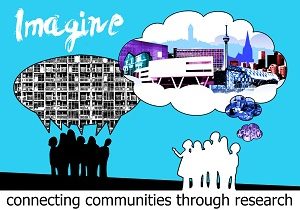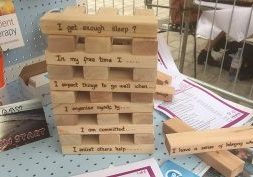Boingboing blogs from… Huddersfield
The 3rd Imagine Conference – Wednesday 9 September 2015, Huddersfield
by David Glynne-Percy, PhD student and boingboing blogger
My excursion to Huddersfield and my first foray into collaborative research began before I arrived in Yorkshire. Sitting on the coach I found myself nestled between a cluster of vegetarians/vegans and meat eaters – I belonging to the latter group. Somewhere before the Newport Pagnall service stations I had joined a research group of Imagine Project workers in an experiment to refrain from meat for a month and to reconvene at a well-known Brighton eatery to discuss our findings. Already I knew my journey north was going to be transformative.
The following days were indeed illuminating, especially for a new kid on the block like me. Someone had dropped out and suddenly there was a space available for me – a PhD student, one year into his reawakened academic odyssey, under the auspicious mentorship of Angie Hart, Suna Eryigit-Madzwamuse and Josh Cameron – all of whom were present in Huddersfield.
I was particularly enthused since we were addressed by Ruth Levitas on the first morning – her lecture entitled ‘Utopia as Method’ an apt launch to the proceedings. I had cited Ruth Levitas in my research application earlier in the year. Her notion that utopia, despite its historic critics, is a useful intervention into sociology as an alternative way to seeing the future and accounting for the past – which in fact is what Imagine is all about – imagining a better future through transformative research.
I began to understand the power of Imagine that first day – how projects in Rotherham and Huddersfield were helping restore community practice and relations, in two towns whose souls had been blighted in recent years through xenophobia. Imagine seeks to connect universities and their local communities through collaborative research. It completely ushers away the traditional notion of the haughty ivory tower doing research on others beyond its walls. The power relation has been changed. No longer just cold academia and its ‘dark materials’ imposing upon a culture, describing it and walking away with ownership of that research. Imagine aims at a democratisation of social research by participatory research methods.
My University of Brighton colleagues are contributing to The Imagine Programme by demonstrating the potential for community university partnerships to bring people from very different backgrounds together to make better and more resilient collective futures. Their work package seeks to explore and better understand capacities and mechanisms to ignite imagination towards the future of healthy, well-functioning and prosperous communities; and to foster resilience and momentum for constructive change through a community-university partnership approach. These resilience-based approaches support individuals and communities to navigate stressful and challenging life situations, and maintain or develop their well-being in spite of threats to their development.
This was illuminating for me in my developing understanding of resilience and how that understanding had travelled, in a space of six months, from the idea that resilience was an individual trait, strength from within – a typical neo-liberal model, to believing that resilience was a question of inequality. If resilience is viewed individualistically it will only serve to camouflage the analysis of social structures that sustain inequalities of privilege, wealth and power. Collaborative enquiry linking communities and universities through research is a potent methodology in the burgeoning Boingboing resilience approach, as championed by my senior supervisor, Professor Hart.
In the following days I discovered the collaborative community of practice work of Greek and German Imagine partners – a Gestalt-based concept of supporting teachers’ resilience as well as, closer to home, research into a collaboratively designed recovery college course in Sussex for adults with mental health problems. In Scotland, young people, thrown accidentally into parenthood, were finding a space to express themselves – potentially through rap and performance poetry.
All in all the Imagine Conference at Huddersfield was an amazing insight for me into the work of Imagine. Not only this, but I was reminded that I have two left feet and a serious lack of rhythm thanks to the group’s initiation into Biodanza. As for my collaborative research into being a vegetarian? Well, perhaps too early to say…

